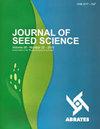Respiratory rates and freezing tolerance of embryos of Inga vera Willd. subsp. affinis (DC.) T.D. Penn. from different regions
IF 1.2
4区 农林科学
Q3 AGRONOMY
引用次数: 1
Abstract
ABSTRACT: Recalcitrant seeds are sensitive to desiccation and low storage temperatures, but there is a gradient of recalcitrance between different species and between populations of the same species. Therefore, tolerance to drying and low temperatures, as well as the respiratory rates of seeds, can be conditioned by the source of the material. The present study aimed to evaluate the relationship among desiccation and low temperature tolerance, and respiratory rates of Inga vera embryos from different regions. The embryos were submitted to three drying levels and incubated for up to fifteen days at -4, -2, 2 and 5 °C. Then, they were evaluated for respiration, germination and electrical conductivity. The embryos tolerated freezing at -4 °C since they were associated with certain levels of drying and a consequent change in the energy status of water. In conclusion, the conditions in which the embryos are formed define their degree of maturation at dispersal, hence their tolerance to desiccation and freezing.银杏胚胎的呼吸速率和耐冻性。亚种。来自不同地区的affinis(华盛顿特区)T.D.Penn
摘要:抗逆性种子对干燥和低温敏感,但不同种间和同一种居群间的抗逆性存在梯度。因此,对干燥和低温的耐受性,以及种子的呼吸速率,可以由材料的来源来调节。本研究旨在探讨不同产地印加胚脱水与低温耐受性及呼吸速率的关系。胚胎被提交到三个干燥水平,并在-4,-2,2和5°C下孵育15天。然后,对它们的呼吸、发芽和电导率进行了评价。胚胎耐受零下4摄氏度的冷冻,因为它们与一定程度的干燥和随之而来的水的能量状态的变化有关。总之,胚胎形成的条件决定了它们在分散时的成熟程度,从而决定了它们对干燥和冷冻的耐受性。
本文章由计算机程序翻译,如有差异,请以英文原文为准。
求助全文
约1分钟内获得全文
求助全文
来源期刊

Journal of Seed Science
Agricultural and Biological Sciences-Agronomy and Crop Science
CiteScore
2.00
自引率
30.00%
发文量
28
审稿时长
12 weeks
期刊介绍:
From 2017 the Journal of Seed Science (JSS) will circulate online version only.
Original scientific studies and communications, not yet published or submitted to another journal for publication and written in Portuguese or English, will be accepted for publication. For manuscripts submitted in English, the authors should provide an adequated version.
The SCIENTIFIC COMMUNICATION is a category of scientific manuscript which describes a technique, an equipment, new species or observations and surveys of limited results. It has the same scientific rigor as the “Scientific Articles” and the same value as a publication. The classification of a manuscript as a SCIENTIFIC COMMUNICATION is based on its content and scientific merit but it can be a preliminary study, simple and not definitive on a certain subject, with publication justified by its uniqueness and contribution to the area.
The Editorial Board of the JSS may invite leading authors of recognized reputation to compose specific Review Articles covering topics of their specialization that will convey to the scientific community the state-of-the-art knowledge related to the specific theme.
 求助内容:
求助内容: 应助结果提醒方式:
应助结果提醒方式:


